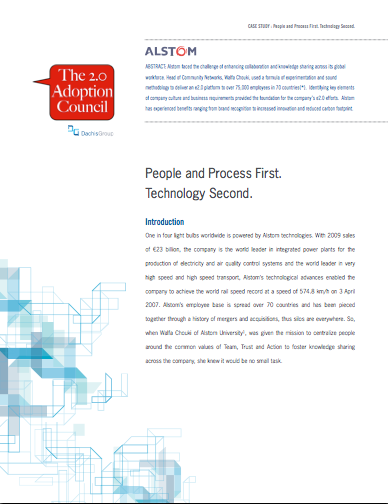 When we set out to investigate case studies, we were looking for “slam dunk” examples where 2.0 initiatives were inextricably tied to business results. In effect, we wanted to begin to dispel the criticisms that e20 was just the next silly, narcissistic exploit to enter the enterprise on the heels of yet another consumer fad: web 2.0.
When we set out to investigate case studies, we were looking for “slam dunk” examples where 2.0 initiatives were inextricably tied to business results. In effect, we wanted to begin to dispel the criticisms that e20 was just the next silly, narcissistic exploit to enter the enterprise on the heels of yet another consumer fad: web 2.0.
Well? We didn’t find those “slam dunk” examples. But, neither did we find any “failures.” What we did find was a massive movement shaking the bedrock of enterprise as we know it. The enterprise plates are still firmly in place, but our investigation revealed tremors– sudden energy being released among the employee population that is poised to crack the foundation of business as we’ve known it.
Time and time again we heard, “This is the most important initiative I’ve ever worked on in my professional life.” There’s something chilling, something inspiring about the people and companies who are leading the charge toward reinventing themselves to become socially savvy. As you read through these profiles and cases, you’ll come to appreciate while all of these companies are still early in the process, they all are confident they will succeed in their long term goals. Some are realizing early successes already. The prevailing operational mission at present, however, is to succeed at catalyzing the “ideological reformation” at the root level of the organization that needs to take place before real business value can be extracted, measured, and fine-tuned. It’s a bit of a Catch-22, and almost as maddening and dangerous as originally described in the novel that coined the phrase.
We will continue to track the progress of these early adopters. Regardless where you are in the spectrum, we all succeed when every case succeeds. We’d like to thank IBM and MIT’s Center for Digital Business for lending support and sponsorship to this series of cases and profiles. Special thanks to all @20adoption members who participated in the series.
Current profiles and cases are posted on The 2.0 Adoption Council web site. Feel free to download at will. We have a few more coming, as well.

I know people tire of me saying this, but it’s still early. We’re all moving toward the organizational change you suggest. See my most recent post. Thanks for the commend, Gerard.
Susan,
It is interesting that IBM sponsored this series, yet I still see no case studies from your council trumpeting IBM’s own e2.0 initiatives. Beyond the legal interlocks, I think I have a good idea why. But that’s not my point here…
I was an IBM’er from ’99 to ’09. Speaking from experience, I would be floored if there is another company in the world that has already achieved richer and more impactful internal e2.0 initiative successes than IBM. I have direct experience with one in particular that fits into your “slam dunk” criteria: IBM’s internal “Technology Adoption Program”.
The IBM TAP program crowdsources developers to create new tools for other employees within the company to “adopt” as beta testers. If the developer(s) have a prototype and a good plan, then the TAP program gives them intranet server resources and support. When the developer offerings go live on TAP, all IBMer’s world wide are able use, rank, provide feedback on them, etc. IBM’s TAP is so e2.0, it is meta-e2.0! What I mean by that is this: it’s an e2.0 program that facilitates the incubation & launch of other e2.0 oriented offerings.
I know what you mean when you say “There’s something chilling, something inspiring about the people and companies who are leading the charge toward reinventing themselves to become socially savvy.” I led the team that wrote and published an in depth case study of the IBM TAP program. That energy poured out of the TAP team members that I worked with when researching the study. So – in case your audience is interested, IBM has already published one heck of a case study on their internal e2.0 efforts. You can download it here: http://www.redbooks.ibm.com/abstracts/redp4374.html
Best – Chris
Thanks Chris. One of the “few more coming” includes the IBM case study. I agree with you (and not because IBM sponsored the series), the IBM case study is the best case study we have to date in this sector. I’ve said that repeatedly, and I see it was a topic of conversation today at the Enterprise 2.0 Summit in Frankfurt.